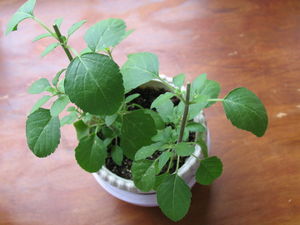Prayer to Tulsi Devi
From Hindupedia, the Hindu Encyclopedia
The Tulsi plant is venerated and is invariably grown in the courtyard of every house. After lighting up the lamp (deepa), the Tulsi plant is supposed to be cleaned and watered while reciting the following prayer:
Thulasi shree sakhi shubhe, papa haarini punyade, Namasthe Naradanuthe, Namo Narayana priye.
Oh, Holy Thulasi,
Bosom friend of Lakshmi,
Destroyer of sins,
Bestower of blessings,
Salutations to thee,
Who is praised by sage Narada,
And is the darling of Lord Narayana

